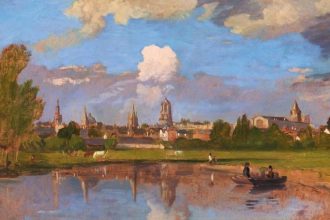Jason Baxter
The experience of nostalgia is a feeling of beauty’s remoteness, but only because it is so far in the future. It is hope.
I went for a long walk in Oxford the other night. The city, of course, is always enchanting, but in early summer and at night, it is so the most. When summer finally comes to England, it comes with festivity: canals are flooded with water plants, blooming flowers, ducklings, and cygnets. Roses are in every yard. At night, though, the city takes on a noble, solemn stillness. With tourists having departed, there are whole passages and lanes wherein there is no sound at all. The facade of Baliol College at night is grandly silent, with pockets of shadow and light from the streetlamps playing over the gothic facade. You can take Brasenoes Lane, a narrow alley bordered by high crumbling walls, into the heart of Oxford, where you sometimes have the Radcliffe Camera and St Mary’s tower all to yourself. The Rad Cam is mottled with grey and white stones, and the tower rises darkly, high into the midnight of the sky.
And as you walk through these streets and quietly pass into and then out of the shadows, you feel a smallness: these buildings have been here for centuries and have that noble antiquity of an earlier and prouder age that did not ask “how much” but “what should be done.” The buildings don’t look down on you, because they’re too lofty, too concerned with higher dreams. You feel small because you know that, to them, you are nothing. They have heard centuries of idle chatter and adolescent boasting; they have heard the first authentic thoughts of learned men; they have seen trees, older than the New World, grow up and die within their walls. These buildings feel as old as the seasons and the streams that flow constantly among them. » Read More
https://theimaginativeconservative.org/2025/04/nostalgia-future-antiquity-eternity-oxford-authors-jason-baxter.html






